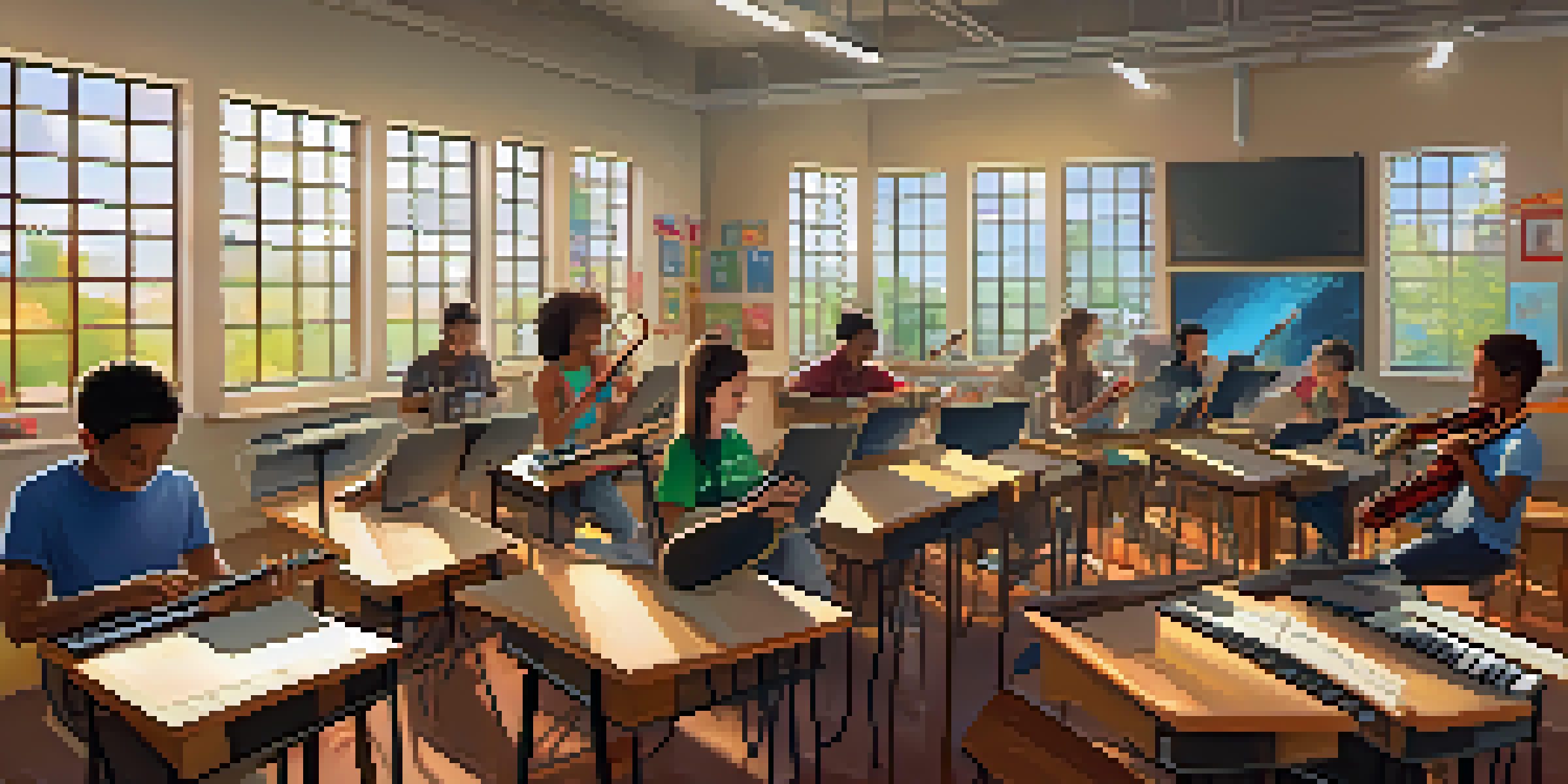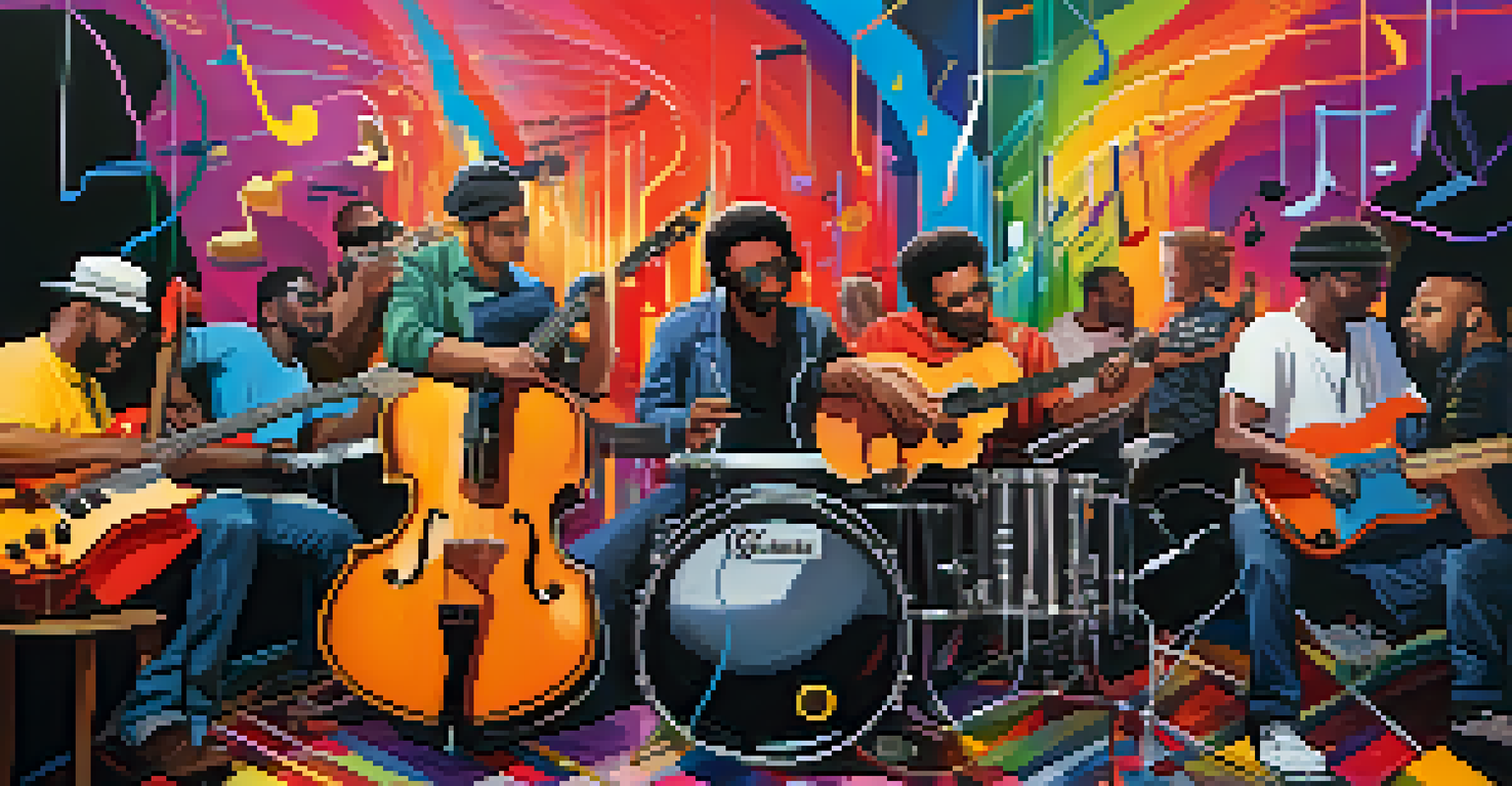The Influence of Mobile Apps on Music Learning and Practice

Mobile Apps: A New Era in Music Learning
In recent years, mobile apps have revolutionized how we approach music education. Gone are the days when learning an instrument required a physical teacher and a plethora of books. Now, with just a smartphone or tablet, anyone can access a wealth of instructional materials and resources at their fingertips. This shift has made music learning more accessible and engaging than ever before.
Technology has the power to transform education, making it more accessible and engaging for learners of all ages.
For example, apps like Yousician and Simply Piano offer interactive lessons that guide users through their practice sessions in real time. These platforms provide instant feedback, allowing learners to correct mistakes on the spot, which is incredibly valuable for developing skills. Furthermore, the gamification aspect of these apps keeps learners motivated by rewarding progress and achievement.
Additionally, the availability of diverse music genres and teaching styles through apps broadens the horizons for budding musicians. Whether you’re a classical pianist or an aspiring guitarist, there’s something for everyone. This personalized experience caters to individual interests, making the learning process enjoyable and effective.
The Role of Technology in Daily Practice
Mobile apps have not only changed the way we learn but also how we practice music. With tools like metronomes and tuners readily available on smartphones, musicians can fine-tune their skills anytime, anywhere. This convenience means that practice doesn’t have to be confined to the home; you can now fit in a quick session during a commute or lunch break.

Moreover, practice apps like SmartMusic and Musician provide tailored exercises that adapt to your skill level, ensuring that every practice session is productive. This adaptability is particularly beneficial for those who may struggle with traditional methods or feel overwhelmed by the vastness of music theory. Instead, they can focus on specific areas that need improvement.
Mobile Apps Revolutionize Music Learning
Mobile apps have made music education more accessible and engaging, allowing learners to access a wide range of instructional resources instantly.
Incorporating technology into practice routines also encourages creativity. Many apps allow users to record their sessions, enabling them to listen back and assess their progress. This reflective practice is crucial for growth and helps musicians identify areas that require more attention.
Collaboration and Community through Apps
Another significant influence of mobile apps on music learning is the sense of community they foster. Platforms like BandLab and Soundtrap allow musicians from around the world to collaborate on projects, breaking geographical barriers. This connectivity not only enhances the learning experience but also promotes the sharing of diverse musical ideas and cultures.
The beautiful thing about learning is that no one can take it away from you.
For instance, a guitarist in New York can easily jam with a vocalist in Tokyo, creating unique musical pieces that blend different styles. Such collaborations encourage learners to step out of their comfort zones and experiment with new genres, ultimately enriching their musical knowledge.
Additionally, many of these apps feature forums and social networking elements where users can share their progress, seek advice, and celebrate achievements together. This built-in support system can be incredibly motivating, helping learners stay committed to their musical journeys.
Access to Resources and Learning Materials
One of the standout advantages of mobile apps in music education is the vast library of resources they provide. From sheet music to instructional videos, learners have unprecedented access to materials that can enhance their understanding of music. This wealth of information is particularly beneficial for self-taught musicians who may lack formal education.
Apps like Musescore and Ultimate Guitar offer extensive catalogs of sheet music across various genres, allowing musicians to explore new pieces with ease. Additionally, platforms like YouTube have numerous tutorials and performance videos that can supplement learning and provide visual context to complex concepts.
Personalized Learning Experiences
These apps offer tailored lessons and practice exercises, enabling musicians to focus on their individual strengths and weaknesses.
This abundance of resources empowers musicians to take charge of their learning. They can dive deep into specific topics, explore different genres, and even follow along with lessons at their own pace. This flexibility is key in fostering a lifelong love for music.
Personalization of the Learning Experience
Mobile apps excel in providing a personalized learning experience that traditional methods often lack. Many apps utilize algorithms to assess a learner's progress and tailor lessons accordingly. This customization means that students can focus on their unique strengths and weaknesses, making their practice sessions more efficient.
For instance, if a learner struggles with rhythm, an app can offer targeted exercises to help improve this skill. This level of personalization not only accelerates learning but also boosts confidence as users see tangible improvements over time.
Furthermore, the ability to set personal goals and track progress through these apps encourages accountability. Learners can celebrate small wins along the way, reinforcing their commitment to their musical education and keeping them engaged.
The Future of Music Education with Mobile Apps
As technology continues to evolve, so does the landscape of music education. The future looks promising for mobile apps, with advancements in artificial intelligence and augmented reality poised to further transform how we learn music. Imagine an app that uses AR to project virtual instructors or interactive instruments in your living room!
These innovations could enhance the learning experience even further, offering immersive and interactive lessons that were previously unimaginable. Such advancements could make music education even more engaging and effective for learners of all ages.
Community and Collaboration Online
Music learning apps foster a sense of community, allowing musicians from around the world to collaborate and share their progress.
Ultimately, as these technologies develop, the potential for mobile apps to enrich music education will only grow. This evolution signifies a thrilling time for both learners and educators, as we embrace new methods to nurture the next generation of musicians.
Challenges of Learning Music through Apps
While mobile apps offer numerous benefits for music learning, they are not without challenges. One significant concern is the potential for distraction. With so many apps and features vying for attention, it can be easy for learners to lose focus during practice sessions. This is particularly true for those who may not have a structured approach to their learning.
Moreover, the lack of in-person interaction can sometimes lead to feelings of isolation. While online communities can provide support, they do not replace the value of face-to-face mentorship and collaboration found in traditional music education settings. Some learners may thrive in a more social environment where they can receive real-time feedback and encouragement.

Lastly, the effectiveness of these apps largely depends on the user's self-discipline. Without the guidance of a teacher, self-motivated learners must be proactive in their practice and learning. This can be a hurdle for some, as staying committed to regular practice requires a level of dedication that not everyone possesses.